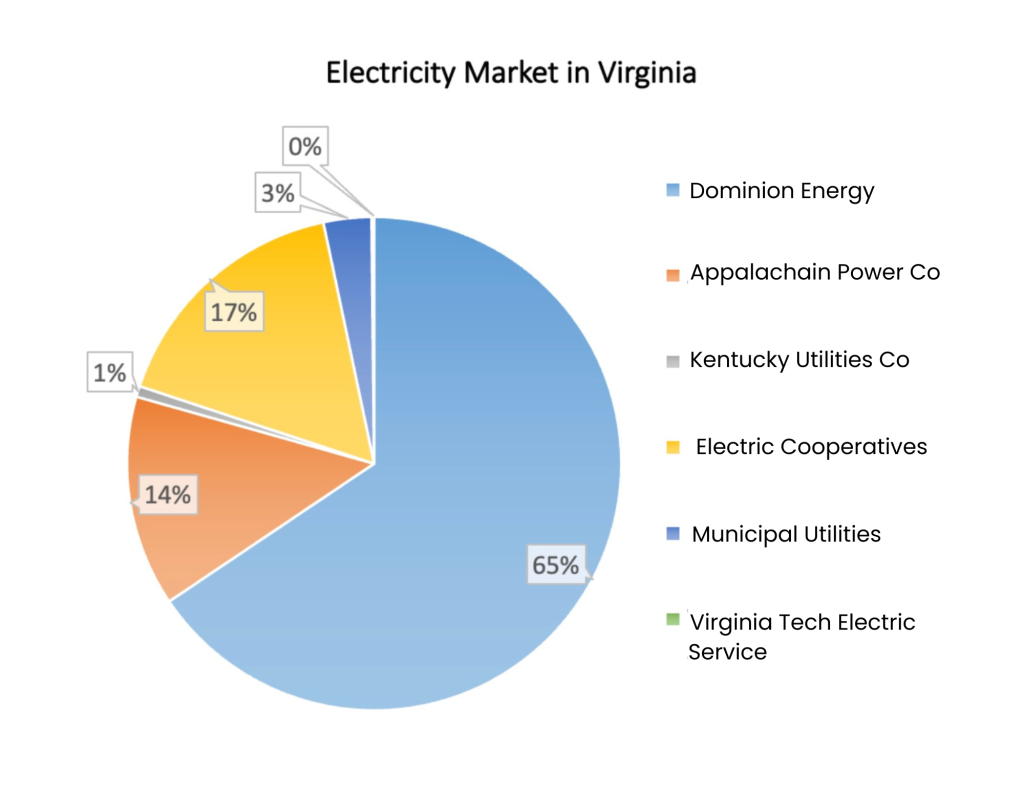“…the reality is that Dominion’s outsized role in Virginia politics has resulted in some of the highest electric bills in the country and more than $1.9 billion in customer overcharges since 2009.“
By: Amy Waters, Clean Virginia Communications Manager
Whether you see its logo associated with a local music festival, plastered on the side of a utility truck, or printed at the top of your electric bill – Dominion Energy is ubiquitous in Virginia. In addition to being Virginia’s largest power provider, Dominion is also the largest corporate political donor in the state and a state-granted utility monopoly, meaning it has no competition for service to approximately 2.7 million Virginians.

In exchange for a monopoly over its service territory, Dominion is overseen by the State Corporation Commission, which is granted authority by the Virginia General Assembly (SCC). The SCC is responsible for setting utilities’ rate of return, or authorized profit level, at a level high enough to ensure the company can attract investors to finance its operations. Under this system, regulators should be able to ensure customers pay a fair price for electricity – but the reality is that Dominion’s outsized role in Virginia politics has resulted in some of the highest electric bills in the country and more than $1.9 billion in customer overcharges since 2009.
Dominion’s political corruption
Dominion is Virginia’s largest corporate political donor – contributing more than $34 million to both political parties in the past several decades. Because state legislators are responsible for regulating the utility, it is a clear conflict of interest for Dominion to give money to the lawmakers in charge of regulating them. This corruption has cost Virginians billions of dollars, damaged the health of communities and the environment and eroded trust in government.
A timeline of Dominion’s influence
Over the past two decades, Dominion has wielded its political influence to manipulate state law for its own gain at the expense of ratepayers.
In 2007, Dominion put forward the Re-Regulation Act (SB1416/HB3068), which established new procedures for reviewing utility rates and earnings. Many of the provisions of this act were drafted specifically to increase Dominion’s profits and allow the utility to skirt regulatory authority, including:
- The establishment of rate adjustment clauses, or RACs. RACs allow the utility to recover certain costs, like building new infrastructure, at the expense of the customer outside the normal base rates. RACs account for over 60% of electric bill increases in the last 16 years.
- Limits on the SCC’s ability to decrease rates and set fair electricity prices, giving Dominion the ability to manipulate its profit level and avoid returning hundreds of millions of dollars of overcharges to customers.
- Mechanisms that allow utilities to keep earnings above their authorized rate of return without accompanying incentives to increase customer savings.
In 2015, Dominion advocated for rate freeze legislation (SB1349), preventing the SCC from reviewing and setting electric rates until 2021. The utility claimed a rate freeze was needed to protect ratepayers from the impacts of federal clean energy legislation. The changes at the federal level never materialized, but base rates remained frozen at inflated levels for the next seven years.
In 2018, Dominion advocated for the Grid Modernization Act (SB966), claiming the bill was designed to repeal the rate freeze and restore the SCC’s ability to review rates. However, Dominion strategically crafted the bill to maximize its profits by:
- Limiting the role of the SCC in determining overcharges and when customer refunds were required.
- Limiting any rate decreases to $50 million.
- Encouraging utilities to invest in new projects related to “grid transformation” by permitting the utility to recover the costs from such projects through “customer credit reinvestment offsets.” This allowed the utility to avoid rate reductions and withhold overcharges to fund projects instead of refunding ratepayers.
In 2020, legislators deeply frustrated by years of utility meddling introduced the Fair Energy Bills Act (HB1132), which would have restored traditional ratemaking authority to the SCC. The bill passed with 77 votes in the House of Delegates but was defeated in a Senate committee. The eight senators who voted to kill the bill had received more than $1 million in political contributions from Dominion.
A new era in Virginia politics
If the years since 2007 highlight the outsized influence Dominion has had in Virginia politics, then 2023 represents a clear shift in the opposite direction. After years of diminished regulatory authority, balance was finally restored during the 2023 General Assembly Session with the unanimous passage of the bipartisan Affordable Energy Act (SB1321/HB1604). The act restored the SCC’s critical oversight powers, allowing the agency to set fair electric rates and protect Virginians from overcharges moving forward.
While the passage of the Affordable Energy Act is a clear step in the right direction, there is still major progress to be made when it comes to Dominion’s political corruption. Banning utility monopoly money from politics would ensure state legislators and regulators make decisions about Virginia’s energy system that more fairly balance utility needs with consumer protection and affordability.
How you can take action
- Support long overdue legislative reform. This upcoming legislative session, beginning January 10th, 2024, several legislators are introducing bills to cap campaign contributions and ban utility monopoly money from Virginia politics. Sign up for our email list to stay up-to-date on opportunities to take action in support of these critical efforts once the legislative session begins.
- Hold your legislators accountable. Visit “Your Map” to see whether your representative in the Virginia Senate and House of Delegates accept money from utility monopolies. If they do, consider sending them an email asking them to take a principled stance against doing so.
For additional information on this topic, read: